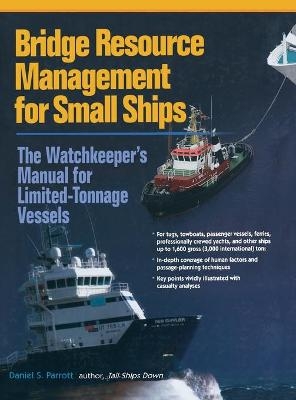
Bridge Resource Management for Small Ships: The Watchkeeper's Manual for Limited-Tonnage Vessels
International Marine Publishing Co (Verlag)
978-0-07-155007-9 (ISBN)
- Titel ist leider vergriffen;
keine Neuauflage - Artikel merken
Your vessel may be equipped with the most advanced technology and the most powerful engines, but the failure to apply the basic principles of bridge resource management can still prevent you from getting where you are going. Satellite systems, ARPA, electronic charts, AIS, sophisticated communication equipment and integrated navigational systems—all these advanced technologies provide valuable capabilities. But accidents still happen, and they usually involve human error. This simple fact has made Bridge Resource Management (BRM) training a requirement for watchkeepers worldwide. Bridge Resource Management for Small Ships: The Watchkeeper’s Manual for Limited-Tonnage Vessels is the first book to address the unique needs of operators of small ships (limited-tonnage vessels) including tugs, ferries, yachts, and other passenger-carrying vessels.
Features:
Case histories to illustrate important pointsA complete course in BRM, suited for studying on your own as well as a complement to your classwork
Topics include: Introduction to BRM, Standard Operating Procedures, Passage Planning, Implementing the Passage Plan, Building a Passage Plan, Situational Awareness and Human Factors, including: Overreliance, Distraction, Stress, Fatigue, Complacency, and Transition; and Human Interactions, including Communications, Teams and Teamwork, Decision Making and Leadership, and Human Error
Captain Daniel S. Parrott began a full-time professional maritime career in 1983 after earning a B.A. in English and Government from Colby College. Since then he has served as mate and master of various tall ships on missions around the world. From 1998 through 2002 he commanded the 170-foot topsail schooner Pride of Baltimore II, a replica of an 1812 Baltimore clipper whose goodwill and educational missions have taken her throughout North and South America and to Europe and the Far East. Parrott holds a master of arts in Marine Affairs from the University of Rhode Island and a U.S. Coast Guard license for Master of Oceans, Motor, Steam and Auxiliary-Sail, 1600 Tons. He now serves on the faculty of the Maine Maritime Academy. HOMETOWN: Blue Hill, Maine
Prologue: The Herald of Free Enterprise Introduction: Why Bridge Resource Management?Part I. Planning and Procedures Chapter One. Standard Operating Procedures Chapter Two. Passage Planning: Appraisal and Planning Chapter Three. Implementing the Passage Plan: Execution, Conferring, and Monitoring Chapter Four. Building a Passage Plan: Tactics and Tools Part II. Situational Awareness and Human Factors Chapter Five. Overreliance Chapter Six. Distraction Chapter Seven. Stress Chapter Eight. Fatigue Chapter Nine. Complacency Chapter Ten. Transition Part III. Human Interaction Chapter Eleven. Communication Chapter Twelve. Teams and TeamworkChapter Thirteen. Decision-Making and LeadershipChapter Fourteen. Human ErrorAppendix: Sample Master/Pilot Information Exchange (MPX)SourcesAcknowledgments Index
| Erscheint lt. Verlag | 16.4.2011 |
|---|---|
| Zusatzinfo | 0 Illustrations, unspecified |
| Verlagsort | Rockport, ME |
| Sprache | englisch |
| Maße | 224 x 287 mm |
| Gewicht | 735 g |
| Themenwelt | Sachbuch/Ratgeber ► Sport ► Segeln / Tauchen / Wassersport |
| ISBN-10 | 0-07-155007-0 / 0071550070 |
| ISBN-13 | 978-0-07-155007-9 / 9780071550079 |
| Zustand | Neuware |
| Haben Sie eine Frage zum Produkt? |
aus dem Bereich


